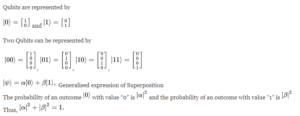Table Of Contents
Quantum Computing is the breakthrough technology that is growing at a fast pace. Today, each passing day it sees new development and the day will not be too far when you will be able to purchase Quantum computers from the market. But, in today’s date, nothing can be said about this technology development. Read more>
Share this post
Quantum Computing & Challenges to Develop Quantum Computers
What is Quantum Computing?
The physics at microscopic levels of atoms or subatomic particles is completely different as compared at macroscopic levels. At those small scales, or at quantum levels, the concept of dual nature comes into play. Dual nature refers to the existence of both particle nature and wave nature, for example, an electron can exhibit both particle nature as well as wave nature. The branch of physics which deals at these smallest scales is termed as Quantum physics. The computation that can be done exploiting concepts of quantum physics is termed as Quantum computing. Quantum computing started with Richard Feynman and afterward many scientists contributed to the development of Quantum computing.
The computers you use nowadays use classical physics concept, i.e. the physics at macroscopic or large levels. At macroscopic levels, the physics is much simpler and the algorithms used in computers for calculations uses general physics laws – Newton laws, Maxwell equations etc. But, at the quantum level, these classical laws and equations fails and are not valid. This is because of the appearance of Planck’s constant in quantum equations and an increase of the uncertainty at microscopic levels. Now, you can imagine how difficult it is to solve quantum problems.
How do Quantum Computers Work?
In digital electronics, you must have studied bits, i.e. 0 and 1. The classical computers, that you use today are completely based on these bits for calculation and all processes or tasks completed by them. ‘0’ means the electrical signal is ‘OFF’ and ‘1’ means the electrical signal is ‘ON’. Similarly, Qubits are the quantum bits which help in quantum computing.
What are the Qubits?
Qubits are bits ‘0’, ‘1’ with a coherent superposition of 0 and 1. The superposition concept comes into play because of the wave nature at the smallest scale. This can be explained with the help of electron spin. The electron has two spins – spin up and spin down. Spin up refers to classical bit ‘0’ and spin down refers to classical bit ‘1’. But, quantum allows them another state also, i.e. superposition of 0 and 1.
Quantum computers work with Qubits but as you can see above, as the number of Qubits increases, it becomes more and more difficult to reach to the solution of a computation problem. The external environment also disturbs the system, therefore Quantum computing becomes almost impossible. The state of the computer become unpredictable due to this, which is called as Decoherence.
Also, if we try to calculate the state of one particle in a two-particle system. Consequently, the state of another particle gets affected due to interactions between the particles. This phenomenon is termed as Quantum Entanglement.
Unlike, Classical computers that we use today, we cannot manufacture Quantum computers using Transistors and Diodes. You can say this is a big problem in the manufacture of Quantum computers. But, there are other technologies which can solve this problem. One such technology is to use Quantum dots in the manufacture of Quantum computers. In Quantum dots, a single electron is trapped in between the atoms which looks like a cage of atoms.
What are the challenges in Quantum Computing & to Develop Quantum Computers?
There are several challenges in the field of Quantum computing. Also, there are many problems which need to be solved to help Quantum computers not remain confined to a few big laboratories. These are –
- Decoherence Prevention.
- Research on Quantum Algorithms that Increase the speed of Quantum Computers.
- To create quantum computers portable – In Today’s date, the size of the Quantum computers is too large that it can only be used in big laboratories.
- Quantum Error Correction.
- Designing of better Quantum circuitry.
- A search of other technologies to manufacture Quantum computers.
- Designing better processors to store more Qubits.
Do Quantum Computers Exist and Where?
Yes, Quantum Computers exist but it is only confined to big laboratories for research and development purposes. The big names in Quantum computers manufacturers are – IBM, D-Wave systems, and Google. Recently this year, in 2018, Google get a lead in the development of 72 Qubit Processor which is the best Qubit Processor till now. Previously, the highest processor that could store Qubits is 20 Qubits processor which was developed by IBM. But, now its Google’s 72 Qubit Processor which they named Bristlecone.
We hope that you understood much about Quantum computing. To get daily updates about our published posts, follow us on Facebook, Twitter or subscribe with us to receive emails of published posts. Also, don’t forget to like and comment below.
You may also like>
Artificial Intelligence (AI) 2018 – The Technology with Noteworthy Future Prospects
